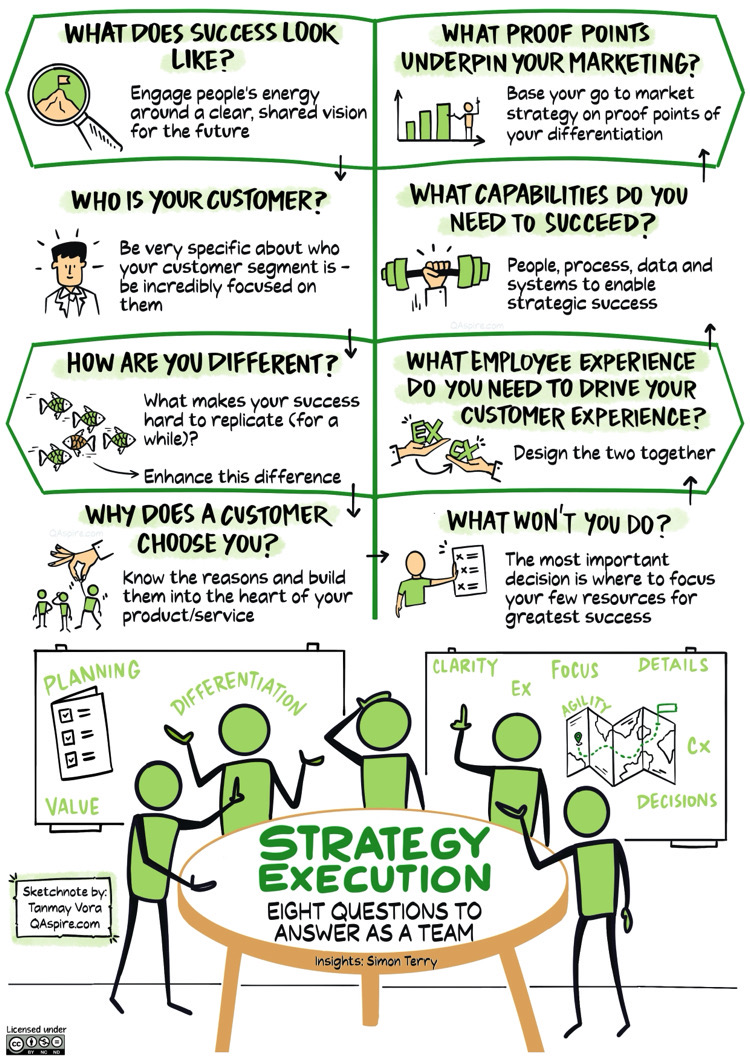8 Questions for Aligning Team on Strategy Execution
It's easy to get caught up in grand vision but execution is about clarity and attention to details. Here's a checklist that might be useful
Tanmay Vora
It is easy to get caught up in grand vision – the big strategy. However, successful execution of any strategy requires two important things: clarity and attention to details.
Strategic Clarity
Things move in the right direction when everyone knows the goal and their part in getting there. Clarity enables your team’s next steps, promotes right decision making and helps people be adaptable.
When teams come together to make something happen, it is important to spend quality time upfront thinking about clarity.
Simon Terry offers very useful set of questions that team members should ask early and often to arrive at clarity.
The questions are:
✅ What does success look like?
✅ Who is your customer?
✅ How are you different?
✅ Why does a customer choose you?
✅ What proof points underpin your marketing?
✅ What capabilities do you need to succeed?
✅ What employee experience do you need to drive customer experience?
✅ What won’t you do?
Here’s a hand-drawn visual checklist that you may find useful – whether you are running a large scale change program, executing a complex corporate strategy or building a new product/service.
Execution is About Details
One thing I would add: Clarity alone isn’t enough, teams also need attention to details. The little things that you think don’t matter until they do – the typo in a proposal, a miscommunication that snowballs into an escalation, a relevant communication that was delayed. You get the point.
Teams that care enough ask the right questions, get to clarity about the value they seek to deliver and customer they are serving. With that clarity, they go and sweat the details.
OVER TO YOU: What do you think about the checklist? What questions would you add?

A Counter View on Attention to Details from Jason Fried
Right after I posted this blog, I read this counter view on attention to details by Jason Fried, which beautifully complements ideas I shared. Here’s Jason’s take as shared on LinkedIn
There’s a lot of talk about how important details are. But what’s often left out of the discussion is timing. Details and timing are intimately related.
God, the devil, beauty, perfection, precision – these aren’t the only things you’ll find in the details. You’ll also find stagnation, disagreement, meetings, and delays.
Ignore details early on.
How often have you found yourself stuck on a little thing for a whole day? How often have you realized that the progress you made today wasn’t real progress? This happens when you focus on details too early in the process. There’s plenty of time to be a perfectionist. Just do it later.
Just get the stuff on the screen for now. Then use it. Make sure it works. Later on you can adjust and perfect it.
Details reveal themselves as you use what you’re building. You’ll see what needs more attention. You’ll feel what’s missing. You’ll know which potholes to pave over because you’ll keep hitting them. That’s when you need to pay attention, not sooner.
My key takeaway:
- Once high level strategic direction is clear, run small experiments to validate your hypothesis.
- Attend to details when you learn while executing, and put the lessons back into your execution.
- Too much focus on details early on can paralyze execution.
Updated: Visual Leadership Pack HD Sketchnotes
If you liked the sketchnote summary above, check out the Visual Leadership Pack of HD Sketchnotes – a compilation of high-resolution sketchnotes with 90+ powerful (and timeless) ideas to elevate your leadership and learning game.
